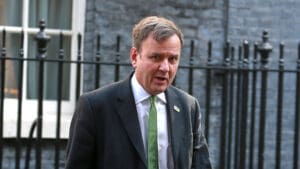The Conservatives have accused Chancellor Rachel Reeves of undermining the Budget process and dragging the Office for Budget Responsibility (OBR) into political controversy after Labour briefed that improved economic forecasts prompted her to abandon plans for an income tax rise.
Shadow chancellor Sir Mel Stride has written to Richard Hughes, chairman of the OBR, demanding clarity on when the Chancellor received the watchdog’s forecasts and whether they played any role in last week’s surprise U-turn. Reeves had been expected to announce a 2p rise in the basic rate of income tax but reversed course amid intense speculation over Sir Keir Starmer’s leadership difficulties.
Reeves dropped the plans two weeks after the OBR handed over its final pre-Budget forecast on 31 October. The timing has fuelled suspicions among Conservatives that the Chancellor’s decision was politically driven rather than dictated by the numbers. In his letter, Stride said the government’s explanations “simply don’t stack up,” adding that the Chancellor had “sullied the Budget process” by briefing details to the press and “drawing the independent OBR into the crossfire.”
Government sources claimed that Reeves acted on updated Treasury analysis of the OBR’s long-term growth projections received on 10 November, which reportedly showed a £10 billion improvement in the public finances. However, the OBR’s own published timetable says its final economic forecast—produced before any policy decisions—was delivered on 31 October and should provide the “stable base” for the Chancellor’s choices.
Stride has asked Hughes to confirm whether the Chancellor received the forecasts on that date, and whether any changes have been made to the projections since then other than those arising from measures submitted by the Treasury for scoring. He also questioned whether Reeves had breached confidentiality by confirming publicly that the OBR had downgraded the UK’s long-term productivity outlook.
Former Treasury permanent secretary Lord Burns said it was a “huge mistake” for the Chancellor to trail an income tax rise and then abandon it, particularly given the reaction in financial markets. UK gilt yields spiked after reports of the reversal, forcing ministers to reassure investors that the decision was based on the OBR’s forecasts rather than political turmoil.
The Chancellor’s retreat from increasing income tax now leaves her needing to raise as much as £25 billion through a patchwork of smaller levies to meet her fiscal rules. Freezing income tax thresholds and higher duties on property, banks, gambling companies and electric vehicles are expected to form part of next week’s Budget.
Treasury insiders said the late-stage change of course has left officials scrambling to finalise the numbers, with several measures still undecided. One source suggested Reeves had previously ruled out higher taxes on banks “when the sun was shining,” but now faced pressure from Labour backbenchers to revisit bank profits.
The political turmoil comes as new data from the British Retail Consortium pointed to a sharp fall in consumer confidence heading into the crucial pre-Christmas season, following what it described as a “tumultuous” month of Budget speculation.
The Treasury said Reeves would set out full details in the Budget. The OBR declined to comment.
Read more:
Tories demand answers from OBR over Reeves’s income tax backtrack








